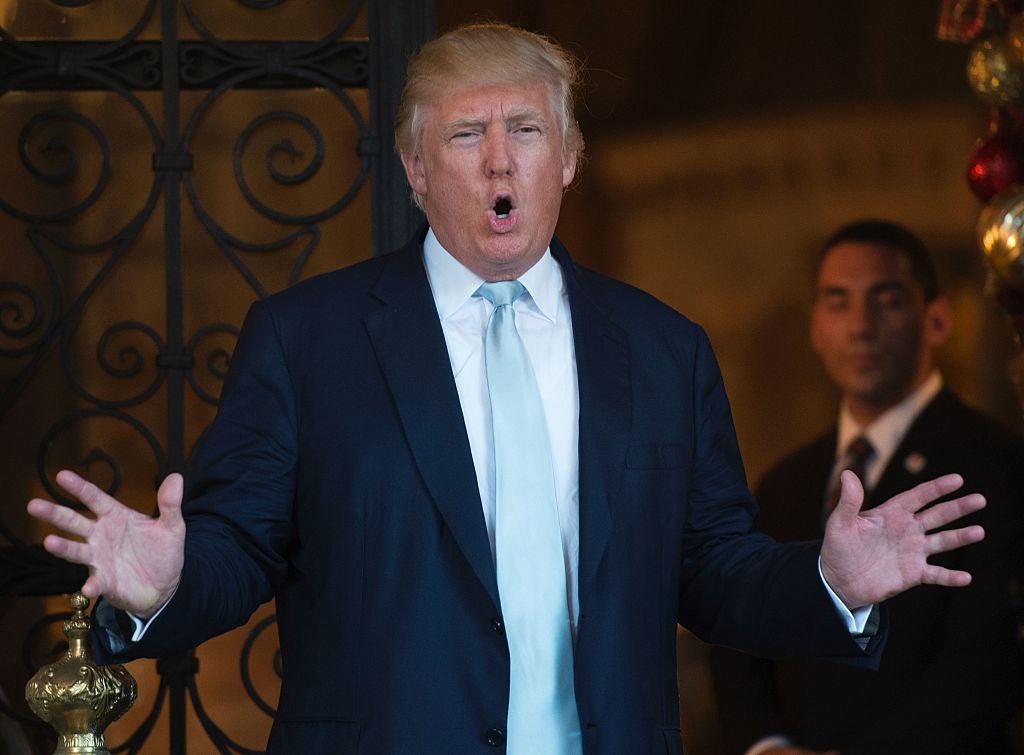Donald Trump's businesses owe $1.8bn to more than 150 different institutions, new study suggests
President-elect faces more questions about conflict of interest as financial reliance on big banks is revealed

Your support helps us to tell the story
From reproductive rights to climate change to Big Tech, The Independent is on the ground when the story is developing. Whether it's investigating the financials of Elon Musk's pro-Trump PAC or producing our latest documentary, 'The A Word', which shines a light on the American women fighting for reproductive rights, we know how important it is to parse out the facts from the messaging.
At such a critical moment in US history, we need reporters on the ground. Your donation allows us to keep sending journalists to speak to both sides of the story.
The Independent is trusted by Americans across the entire political spectrum. And unlike many other quality news outlets, we choose not to lock Americans out of our reporting and analysis with paywalls. We believe quality journalism should be available to everyone, paid for by those who can afford it.
Your support makes all the difference.Donald Trump’s companies are almost $1.8 billion in debt to more than 150 institutions, a new report has suggested – raising fresh questions about potential conflicts of interests when the Republican takes office in January.
The new evidence exposes the extent to which the businessman will soon be responsible for regulating many of the institutions he owes sizeable amounts of money to.
Mr Trump has previously declared $315 million (£254 million) of debt owed to ten different lenders.
However, a new study by the Wall Street Journal claims an additional $1.5 billion is owed by companies that are partly owned by the billionaire.
Experts said the high number of firms to which the Republican owes money, and the significant size of his debts, raised questions about potential conflicts of interest.
Trevor Potter, a former legal adviser to George H.W. Bush and John McCain, told the Journal: "The problem with any of this debt is if something goes wrong, and if there is a situation where the president is suddenly personally beholden or vulnerable to threats from the lenders.
Lawrence Noble, a former lawyer to Federal Election Commission (FEC), said: “The appearance of potential conflicts is dangerous and seriously exists in this situation”.
Candidates for US president have to disclose their financial situation to the FEC but this only includes debts that are owed by companies they full control, which in Mr Trump’s case amounts to $315 million.
But once businesses in which the President-elect has at least a 30 per cent stake are included, an additional, undeclared $1.5 billion (£1.3 billion) of debt emerges. Much of the debt has been repackaged and bought by investors.
One of the banks Mr Trump owes money to is Wells Fargo & Co., which is the trustee or administrator of $282 million of loans to the businessman and his companies. It is also involved in a further $950 million of debt paid to a property that one of Mr Trump’s companies partly owns.
Wells Fargo is currently under investigation by US regulators for fraudulent practices that allegedly included staff opening up to two million accounts without customers’ knowledge.
From later this month, Mr Trump will be responsible for appointing the heads of many of the bodies that regulate Wells Fargo and the other institutions he owes money to, including JP Morgan, BlackRock, Deutsche Bank and Prudential.
Another company the President-elect owes money to, MetLife Inc., is currently engaged in a court battle with the US government over attempts to regulate it more strictly. Mr Trump would have the power to drop the court case when he takes office on January 20.
Documents also reveal that companies partly owned by Mr Trump have borrowed significant sums from the state-owned Bank of China, despite the President-elect’s repeated verbal attacks on China.
The Republican faced significant pressure during the election campaign to publish his tax returns but refused to do so.
The President-elect has promised to remove himself completely from his business operations during his time in office but has not yet announced how this will work in practice.
Join our commenting forum
Join thought-provoking conversations, follow other Independent readers and see their replies
Comments